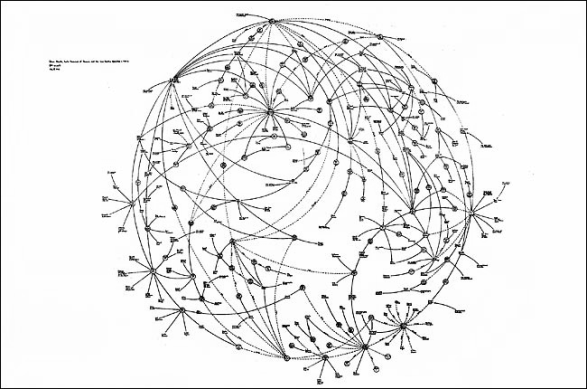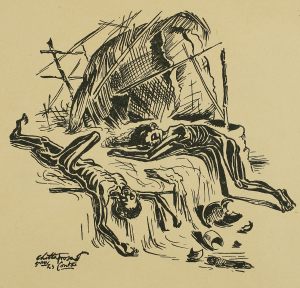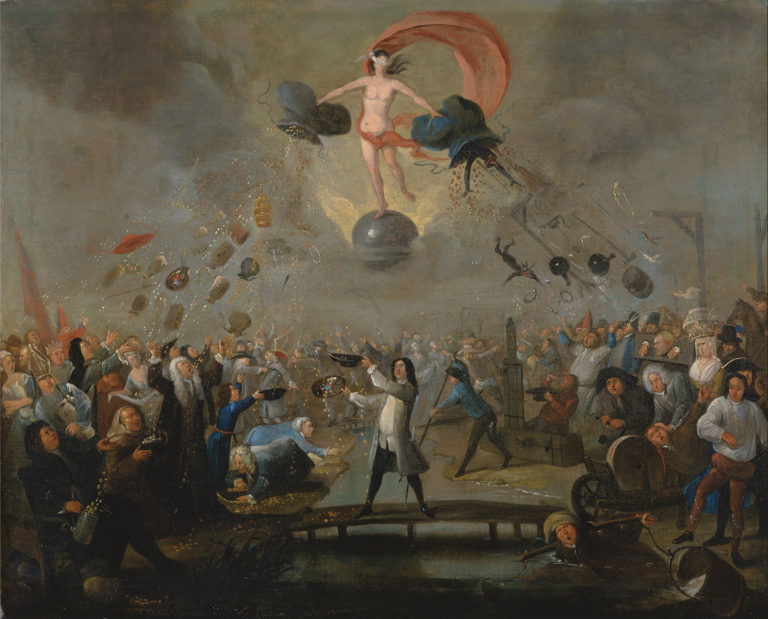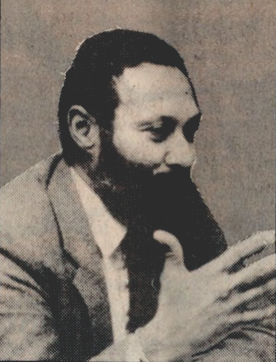Walter Benjamin’s conception of the dialectical image provided a strong foundation for the development of political art during the first half of the twentieth century. However, with the rise of late capitalism and its attendant reorganization of our experience of shock, culture, and history itself, the concept must be reevaluated. This is so not least because, whereas Benjamin operated on the presumption that shock had a kind of self-evident revelatory power, we now occupy a field in which shock is no longer shocking. Through a reconsideration of the contributions made by artists Mark Lombardi and Cindy Sherman, I show how Benjamin’s concept might be saved by strategies of epistemological seduction that operate, not as substitutes for shock, but as a concrete strategy for revitalizing our capacity to experience it.
Issues
Aestheticizing the City Through Storytelling and Walking: Dublin’s 1916 Rebellion Walking Tour
The main concern of this article is situated in the theatrical experience of the 1916 rebellion walking tour as a broader mode of aestheticizing performance, focusing on the ways it traces the process of the tour to ask what the appeal is for international tourists in experiencing often tragic historical events through the use of performative strategies, namely, acts of walking and storytelling. By employing Walter Benjamin’s notion of storytelling and Michel de Certeau’s approach to the walking, this article intends to explore how the 1916 walking tour as a cultural practice rearranges and recreates the Dublin landscape, and how these new meanings are constituted aesthetically beyond their entertainment value. Furthermore, by placing this tour as performative genre, this article investigates how this historic event is embodied by the guide, perceived and transformed by tour groups, thereby creating tourists’ kinesthetic empathy during the tour, by way of the guide’s storytelling with their walking. In doing so, this article will offer a broader context of staging this historical memory that commemorates past events by way of physical engagement with this tour.
Disruptions—An interview with Jacques Rancière
This interview concerns the premise of ‘aesthetics’, as a certain regime of identification, which intervenes within the domain of ‘politics’ and ‘history of art’, as configured in the ideations of Jacques Rancière. From this general premise the discussion provokes us to particularly re-configure the concept of ‘modernism’ in art that is not solely defined through simplistic comparisons with ‘post-modernism’. Instead, a re-configuration of ‘modernism’ lets us reconsider the ‘Avant Garde’ project from the methodology of an ‘aesthetic community’ formulated during the French revolution existing still in the texts of the young Marx of the 1840s. The logic of representations in art moves beyond the objective structures of ‘Dialectical Reason’, and instead gets aligned to the aesthetic logic of being spatio-temporally ‘surplus’. Furthermore, it is the aesthetic logic that introduces the heterogeneity of political symbolizations that underlines a multiplicity of process as against a distinct strategy linking theory and practice thus even challenging a global rationality of defining ‘what is art?’ (Art History) and ‘what is politics?’ (Politics). It is based upon these contingent reversals of the signification of the world, of trying to identify the singular points of disruptions connecting to or not connecting to make a whole, that the interview concludes with questions on the multiplicity of possibles.
Historicizing Basic Income: Response to David Zeglen
This piece argues that Basic Income is, and has never been, a simple “common sense” or “spontaneous” idea for those who want to struggle against poverty. In fact, it but the product of a profound shift in how we thought about the social question since the late 19th century. A shift that, by the mid-sixties, made cash transfers and the price system the main tool when thinking about redistribution against collective provision or more state-centered approaches.
Response to Lindsey Macdonald’s “We are All Housewives: Universal Basic Income as Wages for Housework”
What types of subjectivities and political actors are emerging around calls for UBI? Lindsey Macdonald’s article, “We Are All Housewives,” eloquently speaks to the concept of universality, while also situating socialist-feminist demands for UBI within specific activist traditions. I pose questions about the distinctions between different socialist arguments for UBI and the political groups that advocate for its implementation: first, what are the differences between autonomist and feminist proposals; and, second, how might we distinguish and evaluate organizations that are fighting for a feminist-socialist UBI?
Naturally Radical? A Response to Kimberly Klinger’s “Species-Beings in Crisis: UBI and the Nature of Work”
In this response to Kimberly Klinger’s “Species-Being in Crisis: UBI and the Nature of Work,” John Carl Baker ties Klinger’s analysis to past Marxist debates about human nature and contemporary appeals to human nature by a resurgent US left. While sympathetic to the idea that UBI speaks to a human desire for free productive activity, he critiques the notion that UBI necessarily illuminates the exploitative wage relations of capitalism. Baker proposes that regardless of the validity of Marxist conceptions of human nature, it is the materialist analysis of social relations that must take primacy in any examination of UBI or similar left policy prescriptions.
Response to Caroline West’s “From Company Town to Post-Industrial: Inquiry on the Redistribution of Space and Capital with a Universal Basic Income”
This reply critically analyzes the concept of “solidarity” in Caroline West’s account of the role that a Universal Basic Income (UBI) could play in Central Appalachian re-development. I argue that a robust structural form of “solidarity” would necessarily play an essential role in formulating a political bloc capable of implementing an ambitious project like a UBI. In addition to this implicit role of a structural form of solidarity that can connect various communities and constituencies together into a powerful political bloc, Caroline West also articulates an important role for highly local forms of community and solidarity in this region’s transformation. Given the two distinct ways that “solidarity” functions in her account, I raise questions about how the formal features of a UBI relate to both its local and more structural forms.
Introduction: Years in Cultural Studies
This special section is another iteration of cultural studies telling its own story. In our particular iteration, we offer here essays focused on specific years in the history of cultural studies. Our aim is to provide a pedagogical resource, a place for documentation and excavation, and a forum for more storytelling.
1983—Stuart Hall Visits Australia and North America
Throughout 1983 Cultural Studies continued to spread outside the United Kingdom, spurred by Stuart Hall’s tour of Australia and parts of the United States where he presented lectures connecting current ideas of what it means to study culture in often disparate and intense political climates across the globe. Myriad publications published in 1983 provide insight into how Cultural Studies circulated among scholars in varying disciplines while still in its infancy. This article situates Cultural Studies primarily within a North American context focusing on the pivotal event of the year: the teaching institute held prior to the 1983 conference at the University of Illinois where Hall delivered what would be eight influential lectures in the field of Cultural Studies. Further, I provide insight into an understudied conference held in Australia where Hall’s impact led to the birth of an Australian Cultural Studies journal. Finally, I provide an overview of some of the pivotal publications of the year, connecting ideas of hegemony, power and dominance, reflexivity and Marxism within a western context.
Review of Rated Agency: Investee Politics in a Speculative Age by Michel Feher (Zone Books)
Michel Feher’s new book “Rated Agency: Investee Politics in a Speculative Age” offers both critical evaluations and political discussions of the existing socio-economic theories about the dynamics of capitalism in the past half-century and the possible alternative directions current capitalism could take. Feher argues that whether we are a company in search of funding from shareholders, an indebted public authority seeking bondholders, or an instrumentally precarious individual in need of social benefits, we would all be subject to the issue of accreditation and indebtedness, in which being an investee is more appreciated in an age in which investors have become all-powerful.
Review of Declarations of Dependence: Money, Politics, and the Aesthetics of Care by Scott Ferguson (University of Nebraska Press)
Scott Ferguson explores the implications of Modern Monetary Theory (MMT) for contemporary metaphysics and aesthetics. He asserts that only MMT can rescue society from neoliberal austerity by realizing the potential of money as a boundless public resource with an infinite capacity to serve human and environmental needs. In order to explain the resistance to MMT, Ferguson retraces the prevailing understanding of the money form to the political crises of the fourteenth-century republic of Florence. He presents the art of the Florentine renaissance as a response to these crises and the expression of the obsession with haecceity, or ‘thisness’, which has obscured money’s restorative potential for centuries. He also suggests that the sacramental theology of the thirteenth-century Dominican friar St. Thomas Aquinas offers a potential path out of the intellectual blind alley of haecceity, towards a just, tolerant, and ecologically sustainable future.
Review of Political Blackness in Multiracial Britain by Mohan Ambikaipaker (University of Pennsylvania Press)
Mohan Ambikaipaker’s “Political Blackness in Multiracial Britain” is distinctive both for its setting and for its personal engagement. Ambikaipaker practiced “activist anthropology” by carrying out “observant participation” as a caseworker for the Newham Monitoring Project, a community activism organization, over the course of two years. The book alternates between anecdotal accounts of racism and the author’s theoretical and historical framing of those accounts. Ambikaipaker’s writing is compelling, his theoretical grounding is thorough, his empathy is apparent, and the fieldwork underpinning it is considerable and consequential.
Review of Mapping Queer Space(s) of Praxis and Pedagogy, edited by Elizabeth McNeil, James E. Wermers, and Joshua O. Lunn (Palgrave Macmillan)
In this edited collection, Elizabeth McNeil, James E. Wermers, and Joshua O. Lunn draw together cutting-edge thinkers on queer pedagogy and queer activist praxis in an effort to dismantle the historical underpinnings of education as a tool of oppression. As an alternative to normative education, the editor offer up queer pedagogy as a methodology for “challenging accepted hierarchies, binaries, and hegemonies that have long dominated pedagogy and praxis” (5). The collection features the queering of traditionally normative classroom and academic spaces alongside queer approaches towards less commonly acknowledged sites of learning, such as social media websites, community advocacy meetings, and prisons.
Editors’ Introduction: Expanding Laterally
This issue marks a number of important milestones for the journal and features a combination of peer-reviewed academic articles, a forum on universal basic income (UBI), and book reviews. With this issue we are also pleased announce a number of changes to the Lateral editorial team. These changes significantly extend the possibilities for the journal into the future, while reinforcing the work that is already underway.
Killer Drones, Legal Ethics, and the Inconvenient Referent
I offer a close reading of the legal and political discourses by means of which the United States government recently has sought to legitimate its use of weaponized drones to carry out targeted assassinations of suspected anti-U.S. combatants abroad. Situating my analysis in the context of philosophical approaches to the problem of truth and linguistic reference, I examine official government speeches, legal documents, and reports of civilian casualties. My semiological critique of these texts is carried out both within and against the “humanitarian” framework of just war theory, my dual approach being necessitated by the twofold strategy of the government’s justificatory rhetoric: on the one hand, the government’s public discourse distorts the accepted meaning of certain unambiguous and pragmatically functional legal signifiers (the jus ad bellum use of terms such as self-defense, imminence, and necessity, for example); on the other hand, it exploits the uncertainty that is endemic to some of those very same terms (necessity and proportionality in particular) when they are used to refer to the jus in bello quantification and valuation of incommensurable variables—of, typically, a particular number of civilian casualties relative to the amount of “military advantage” to be derived from the attack that “unintentionally” produces those casualties.











